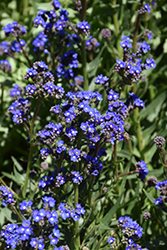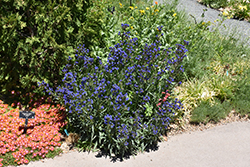It's all about ...
plants

Plant Height: 12 inches
Flower Height: 18 inches
Spread: 24 inches
Sunlight:
![]()
Hardiness Zone: 6b
Other Names: Cape Forget-Me-Not, Common Bugloss
Description:
Outstanding clusters of blue forget-me-not flowers will brighten any space, blooming over a long period; team up with other annuals and perennials for eye-popping combinations
Ornamental Features
Summer Forget-Me-Not features showy cymes of royal blue star-shaped flowers with white eyes at the ends of the stems from early to late summer. Its small narrow leaves remain green in colour throughout the season.
Landscape Attributes
Summer Forget-Me-Not is an herbaceous biennial with an upright spreading habit of growth. Its relatively fine texture sets it apart from other garden plants with less refined foliage.
This is a relatively low maintenance plant, and should be cut back in late fall in preparation for winter. It is a good choice for attracting birds, bees and butterflies to your yard, but is not particularly attractive to deer who tend to leave it alone in favor of tastier treats. Gardeners should be aware of the following characteristic(s) that may warrant special consideration;
- Self-Seeding
Summer Forget-Me-Not is recommended for the following landscape applications;
- Mass Planting
- Rock/Alpine Gardens
- Border Edging
- General Garden Use
- Groundcover
Planting & Growing
Summer Forget-Me-Not will grow to be about 12 inches tall at maturity extending to 18 inches tall with the flowers, with a spread of 24 inches. Its foliage tends to remain dense right to the ground, not requiring facer plants in front. It grows at a medium rate, and tends to be biennial, meaning that it puts on vegetative growth the first year, flowers the second, and then dies. However, this species tends to self-seed and will thereby endure for years in the garden if allowed.
This plant should only be grown in full sunlight. It is very adaptable to both dry and moist growing conditions, but will not tolerate any standing water. It is considered to be drought-tolerant, and thus makes an ideal choice for a low-water garden or xeriscape application. This plant does not require much in the way of fertilizing once established. It is not particular as to soil pH, but grows best in poor soils. It is somewhat tolerant of urban pollution. This species is not originally from North America..
This plant is not reliably hardy in our region, and certain restrictions may apply; contact the store for more information.

